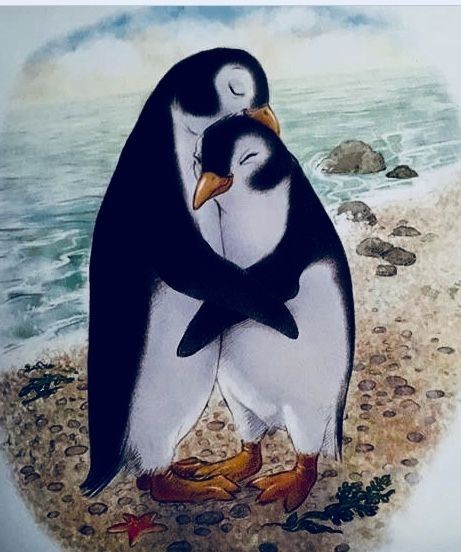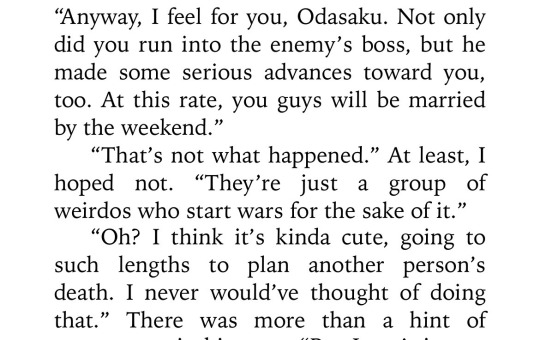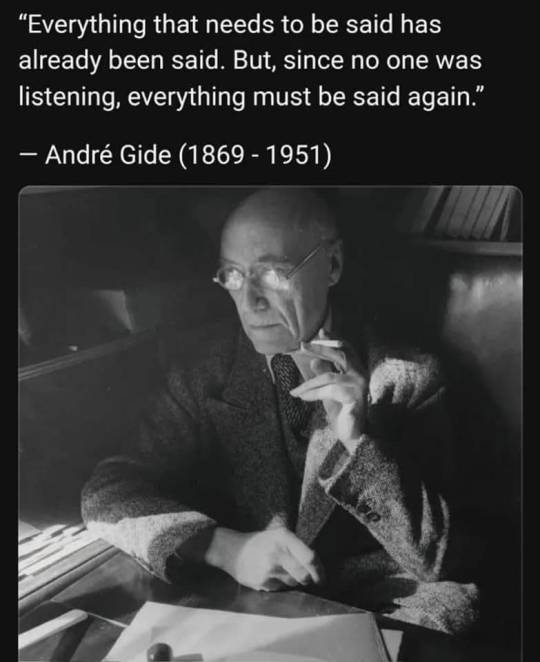#andre gide
Text

“Believe those who are seeking the truth; doubt those who find it.”
— André Gide
#andré gide#andre gide#literature#lit#literature lover#literature quote#literature quotes#french literature#philosophy#philosophical#philosopher#philosophers#philosophy of life#philosophy quote#philosophy quotes#quote#quotes#excerpts#excerpt#quoteoftheday#booklover#book#bookworm#books#booklr#book quotes#book quotations
137 notes
·
View notes
Text

"İleride ne olacaksam hep senin için olmak istiyorum."
116 notes
·
View notes
Text
I have the childish feeling that God is no longer in the same place.
Strait is the Gate, André Gide, 1909
92 notes
·
View notes
Note
I've started reading The Great Gatsby (I've fallen into the reading classical literature trap 😔. I really need to finish Crime and Punishment.)
Anyhow I think it's really interesting how Asagiri chose to characterize many of the people in BSD. Especially after learning that irl Fitzgerald was more of a cynical person (at least towards the end of his life) than his animated counterpart. And it made me think of all the other characters of the show and how their characterized.
What was Asagiri's purpose as he came together with these characters? Why'd he have some characters act as their irl counterparts while others act more like the characters they wrote or people in their lives?
These aren't really questions that I wanted the answers to they were moreso just thoughts that I had. I'd love to have a peek into this man's mind and how it works
I think a lot of us have fallen into that trap LMAO. This is my favorite topic though. I could talk about this forever because Kafka Asagiri is an interesting person who has integrated a lot of literature into this one series. I don't know what goes on in this man’s mind and I know these aren't literal questions, but I am interested in sharing what I know!
As you've pointed out, some characters do act more like the people in these works written by them than the actual people. BSD isn't purely just taking these authors, their relationships, and then implementing them just like that. it also takes these authors’ literary personas, their impact socially, and their works to make them into who they are. Asagiri is doing this because it makes it more interesting, but also imagine writing about this authors where most of them lived depressing lives with qualities that don’t make uh, the type of story you want to tell.
I’m impressed with how creative he is.
I’m trying to limit myself on how much I should talk about this, but I fear that I’ll leave out important bits about how Asagiri incorporates these people into the work. I’m also just jittering and excited. Like I almost forgot to bring up the fact the reason BSD has a war narrative is because it takes Japanese authors from Meiji to Shōwa era, so about the time Western influence kicked in, forcing them to modernize and keep up with the rest of the world during what is a fairly short time for huge development like this, to post-war Japan where, you know, the Occupation of Japan is happening and they have to intake the traumatic repercussions of everything before that.
This can make The Great War functionally WW2, but obviously not a one to one match. I’m not a historian or anything, but this should come to mind for anyone who’s in the know about some Japanese history. Now that I’m bringing it up though, Mori’s attitude during the flashback with Yosano is put into context because he pretty much says himself that he needs his country to realize that they keep up with the rest of the world and that the battlefield is changing, and real life Japan did not care about how they did that.
With N, Chuuya, and Stormbringer too. I’m almost hesitant to bring this up because it’s so serious, but yes, Japan did do lethal human experimentation for that same purpose to keep up with the rest of the world and prove themselves.
Ahh, I went off track. Sorry, we were talking about how Asagiri writes characters, right? There is a lot of crossover between the real authors and their writing, so it’s sorta hard to tell with people like Dazai where the work influence ends and the the real person begins.
For me currently in my classic lit research period, I’m almost upset at myself for barley reading anything by Ryuunosuke Akutagawa because he’s my favorite character. I’ve just been so caught up doing my Oda Sakunosuke essay that I don’t have too much time for other authors. I’ve also picked up “The Similitude of Blossoms: A Critical Biography of Izumi Kyōka” recently (and A New Hamlet by Osamu Dazai, but that’s not important).
Ah, how much should I talk about.… hmm… how about Chuuya as an example of Literary Voice vs Real Person…. Lucy Montgomery and Edgar Allen Poe for Social Impact (for Japan specifically)…. and then.. Oh whatever, I’ll figure it out. One day I’ll talk about Kyouka, but not now. I’d feel ill prepared.
If you’ve ever read a poem by Chuuya Nakahara, taken in the emotion and deep feeling, and then found any fun facts about his interactions with other authors, there’s a huge contrast between those two modes that can be jarring. Im sure you can tell how that carries over to BSD. I’m impressed by how Asagiri is able to balance both the brash attitude of Chuuya and the inner literary voice that voices the emotion and care he has in him.
Edgar Allen Poe is slightly more obvious than Lucy’s influence (or maybe it’s Lucy’s, ah it depends), but both pop out at you when it’s pointed out. He was one of the first American authors to be introduced to Japan and fairly popular, but mainly we would point to Edogawa Ranpo as the most blatantly influenced by him and who his name is quite literally attached to. While Lucy Montgomery isn’t attached to anyone in particular, Anne of The Green Gables was wildly distributed in Japan when there were few english children books and became a hit.
There’s a television series too if you search for it. Any redhead, pigtail-braided girl you see in some Japanese media is because of her! It’s probably why these two have the most presence in the story currently compared to other members of the Guild and work with the Agency at times.
There are times when Asagiri will use influences outside of the author’s own catalog to create them, some literary like Albert Camus’s The Stranger and The Myth of Sisyphus (in writing characters like Dazai or Fyodor, I could make a post about that), and some just of his own anime/manga interests in other series like Jojo, Cowboy Bebop, Black Lagoon, etc. if you’re familiar.
I’d feel bad if I don’t at least show one example of this so, how about an Odasaku example with The Long Goodbye by Reymond Chandler? I was going to avoid talking about him until the essay, but I can’t help myself. Many have pointed out these parallels before, but Asagiri did point it to be his favorite book last year in an interview.
If you’ve noticed that the presentation for Dark Era in the anime comes off like a Noir film just like how Untold Origins came off like a black and white samurai film, good job! The Long Goodbye is a Noir novel about a detective named Phillip Marlowe who is unable to let go of a case involving a friend that was accused of murdering his own wife, but supposedly commits suicide and confesses to it before Marlowe is able to leave custody. By the end of the book, he uncovers the real perpetuator (a past lover of Terry Lennox’s before he was ever called by that name) and finds out where Lennox really is by poking into the story of where the message he got was sent.
He comes in with a new look and identity, and he asks if it’s too early for a gimlet. They say their last few words to each other, Marlowe flipping back and forth from acknowledging him as Terry Lennox and as a person he never knew, and then Marlowe tells him that “he’s not here anymore”. Marlowe had already told him goodbye when it was sad and lonely, so Lennox does the same here. That ends that mutual, long goodbye and he never sees Lennox again.
The immediate response I’ve see about this is how it parallels the relationship between Dazai and Odasaku. In The Day I Picked Up Dazai, just like how Marlowe brings him to his home to clean him up and meet up at the same bar for the next few months of their friendship, Odasaku also does so with Dazai and drinks a Gimlet for reasons he doesn’t know. In reality, Gimlets are a representation of the friendship between Marlowe and Lennox as it’s Lennox’s favorite drink. It makes it a little painful when Marlowe ignores him when he ask to go get a gimlet at that same bar they always went.

BEAST is more hyper specific about it by having Dazai ask the same question that Lennox asks when he gets smoked out and Odasaku asking for a gimlet with no bitters, which is specifically how Lennox takes it. Odasaku does not drink the gimlet at all though, showing that there is not friendship to start or accept or say goodbye to, as Lennox does ask Marlowe to drink a Gimlet to say goodbye to him in the letter. Just like TDIPUD is like their beginning, BEAST is their ending without ending because BEAST Dazai is not the same person he was friends with.
Odasaku fulfills being a detective and Dazai is the tragic friend with a past he doesn’t say anything about. Great. Now what I think people are missing when they entirely focus on Odasaku and Dazai when they talk about Lennox and Marlowe is that Lennox is narratively also Andre Gide.
If we were to split Lennox into three people just like his three identities, this is what it would look like:
The Friend: You help him out and don’t judge for his faults, in turn you go out to a bar with each other. It’s uneasy, but it’s worth a lot to the both of you. Eventually you have to part ways in death. (Dazai & Terry Lennox)
The Unknown: Is he someone you know? He acts like it, but he looks nothing like what you’ve encounter before. Maybe in some world you were, but that’s not now and it’s too late for this goodbye to be playing out. You let it happened though and you never see him again when he walks out that door. (BEAST Dazai & “Señor Maioranos”)
The Soldier: The past is right around the corner and its come to bite you in the ass. White hair and war memories haunting him with a scar as a reminder, he’s a reflection of you but maybe not. Who knows? (Andre Gide & “Paul Marston.”)
The initials “P.M.” of both his past name and Phillip Marlowe’s is meant to clue in how Eileen (the past lover) is connected to Lennox by her thinking of Marlowe as her past lover as she attempts to seduce him in some trance. What I’m trying to note here though is that you can take this as Lennox being another reflection of himself. It’s easy to do that reading for both Dazai and Gide as they’re both his foils and are purposely similar, but Gide aligns more with this past identity than Dazai does and retains his white hair.
Uhhh, wasn't planning to make a mini-analysis in the middle of my talking but okay. I'm leaving it off there. I went blank a lot while writing because I didn’t know what I wanted to comment on. There's too much to say about this large cast. I have way more literary fun facts and ideas to say, but nah.
#bsd#bungou stray dogs#dazai osamu#mori ougai#bsd analysis#bsd meta#bsd edgar allan poe#bsd lucy#oda sakunosuke#odasaku#bsd beast#the day i picked up dazai#andre gide
57 notes
·
View notes
Text
No because… they really skimped out on so much characterisation in bsd. Tonan did all that against Fukuzawa because his father–whom he clearly loved–was murdered. Higuchi joined the Mafia to provide for her little sister. Kunikida cried for two hours after the Agency was reunited because he was so overcome. Again, because he loves them all. Ango visits Oda’s grave, Gide calls Akutagawa a ‘little black duckling’, Francis shows Atsushi the amount of life-support Margaret is on just to stop her dying, Akutagawa smiled at Atsushi while he was dying. Atsushi calls Akutagawa a lawnmower, Yosano also smiles when she thinks she’ll die, Ango gets teased by his bodyguards, Dazai and Fyodor throw food at each other. All of these are such humanizing tributes that flesh out everyone and give more context for how they are
#fuck bones#bsd#bungo stray dogs#manga vs anime#bsd tonan#fukuzawa yukichi#sakaguchi ango#akutagawa ryuunosuke#atsushi nakajima#yosano akiko#f scott fitzgerald#bsd fitzgerald#margaret mitchell#dazai osamu#fyodor dostoevsky#andre gide
83 notes
·
View notes
Text
start where i end
“Do you know why you’re here?” Mori tilts his head. Gide shakes his head. He should be decaying by now, after all. Mori clicks his tongue.
“Hmm. Then answer me something else,” And he leans further, smiling. His fangs are not canine. They’re sharper, more poised. Serpentine and full of venom. Gide thinks he’s prepared to let it course through his veins. He sees no other ending to this, after all.
“Why did you go after the orphans of the Dragon’s Head Conflict?”
-
on gide & elise and wolves & ravens
oneshot, 1265 words, gide centric, everyone lives / nobody dies au, this was written in two days and it's @karl-raccoon-in-a-teacup's fault /aff
aka: gide becomes elise's bodyguard after the mimic incident
#pidge's fic posts#andre gide#andre bsd#gide bsd#bsd gide#bsd andre#bsd andre gide#andre gide bsd#elise bsd#bsd elise#elise#fic#bsd fic#my fics#my writing#bsd fanfic#this was written in a hell of an autistic frenzy <3#there will (hopefully) be more
36 notes
·
View notes
Text
dazai shipping oda and andré will always be funny to me idc

#dazai seeing two enemies that are pit against each other and have to fight to the death: ‘‘but what if they fucked’’#he’s just like me fr#dazai osamu#oda sakunosuke#andre gide#bsd
421 notes
·
View notes
Text
Dazai: if I had nickel for every time one of my best friends was the protagonist of a light novel where they had to fight a French man with the same ability as them, I’d have two nickels, which isn’t a lot, but it’s weird that it happened twice
#Dazai’s only interactions with French ppl were them trying to murder his friends so that’s interesting#and now he’s in a prison in (presumably) France#bsd#bungo stray dogs#bungou stray dogs#bsd dazai#bsd chuuya#bsd odasaku#bsd Oda#oda sakunosuke#chuuya nakahara#bsd verlaine#bsd gide#andre gide#no one ever talks about Gide for some reason#stormbringer#bsd dark era#dark era#bsd light novel#meme
835 notes
·
View notes
Text

"...so sufficient is a single night for the expression of the greatest love, and so obstinately does my memory recall that night alone. It was a flashing moment that caught and mingled our souls in its laughter. . . . But I believe there comes a point in love, once and no more, which later on the soul seeks — yes, seeks in vain — to surpass; I believe that happiness wears out in the effort made to recapture it; that nothing is more fatal to happiness than the memory of happiness. Alas! I remember that night. . . ." ― André Gide, The Immoralist
Painting: "Night" by William Orpen
#classical literature#classics#quotes#poetry#classical poetry#booklover#books#booklr#books & libraries#book quotes#bookblr#books and reading#reading#goodreads#art history#artblr#andre gide#literary quotes#literature#lit#dark academia quotes#dark acadamia aesthetic#dark academia#quotations#love quotes#classic literature#classical painting#romantic academia#romanticism#art academia
38 notes
·
View notes
Text
anılarımda beni yalnızca sen tedirgin ediyorsun.
ingeborg bachmann - dar zaman
#kitap#edebiyat#blogger#felsefe#kitaplar#blog#kitap kurdu#şiir#charles bukowski#ingeborg bachmann#malina#dar zaman#andre gide#dar kapı#simone de beauvoir#love letters#martin heidegger#ahmet hamdi tanpınar#saatleri ayarlama enstitüsü#sabahattin ali#kürk mantolu madonna#milan kundera#varolmanın dayanılmaz hafifliği#tezer özlü#marcel proust#alain de botton#jacques lacan#sigmund freud#fernando pessoa#huzursuzluğun kitabı
18 notes
·
View notes
Text

“It is better to be hated for what you are than to be loved for what you are not.”
— André Gide
#andre gide#literature#lit#literature lover#literature quote#literature quotes#french literature#philosophy#philosophical#philosopher#philosophers#philosophy quotes#philosophy of life#quote#quotes#excerpts#excerpt#quoteoftheday#booklover#book#bookworm#books#book quotes#book quotations#love#hatred
158 notes
·
View notes
Text

"Onun yanında mutlu hissediyordum kendimi,
öylesine mutlu ki,
düşüncem,
onun düşüncesinden farklı hiçbir şey aramıyordu artık;
ben de onun gülümsemesinden,
çiçekli ılık bir yolda onunla el ele yürümekten başka hiçbir şey dilemiyordum."
63 notes
·
View notes
Text
I moved a stranger among ordinary people, like a man who has risen from the grave.
The Immoralist, André Gide, 1902
41 notes
·
View notes
Text
The BSD Ultimate Wet Cat Debate
Round One!
22 notes
·
View notes
Text

“Olduğun şey için nefret edilmek, olmadığın şey için sevilmekten daha iyidir.”
44 notes
·
View notes
